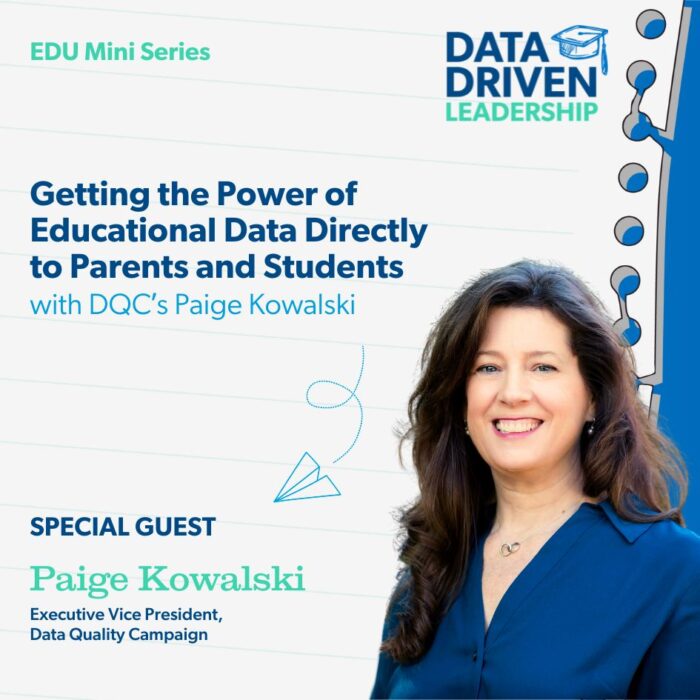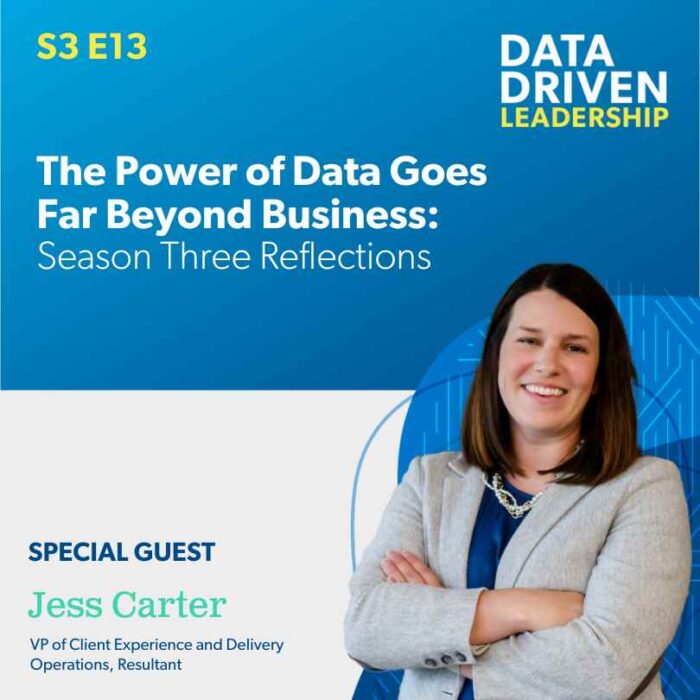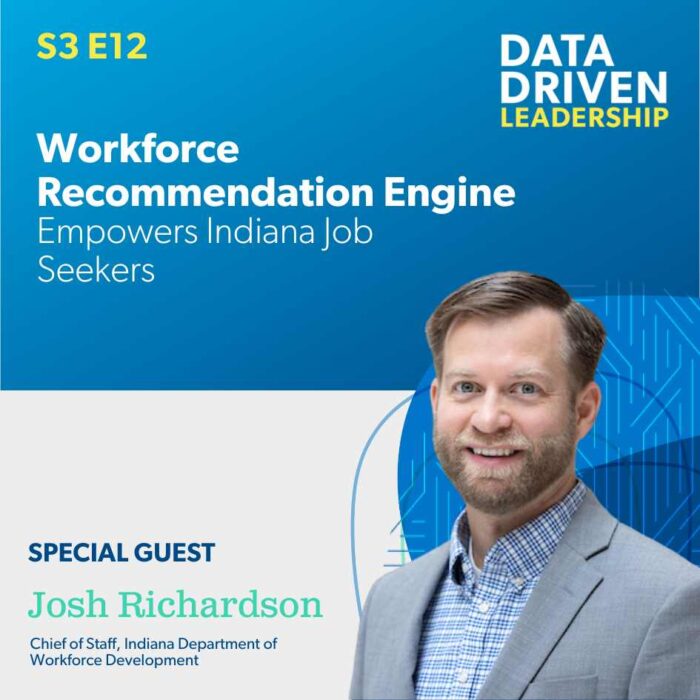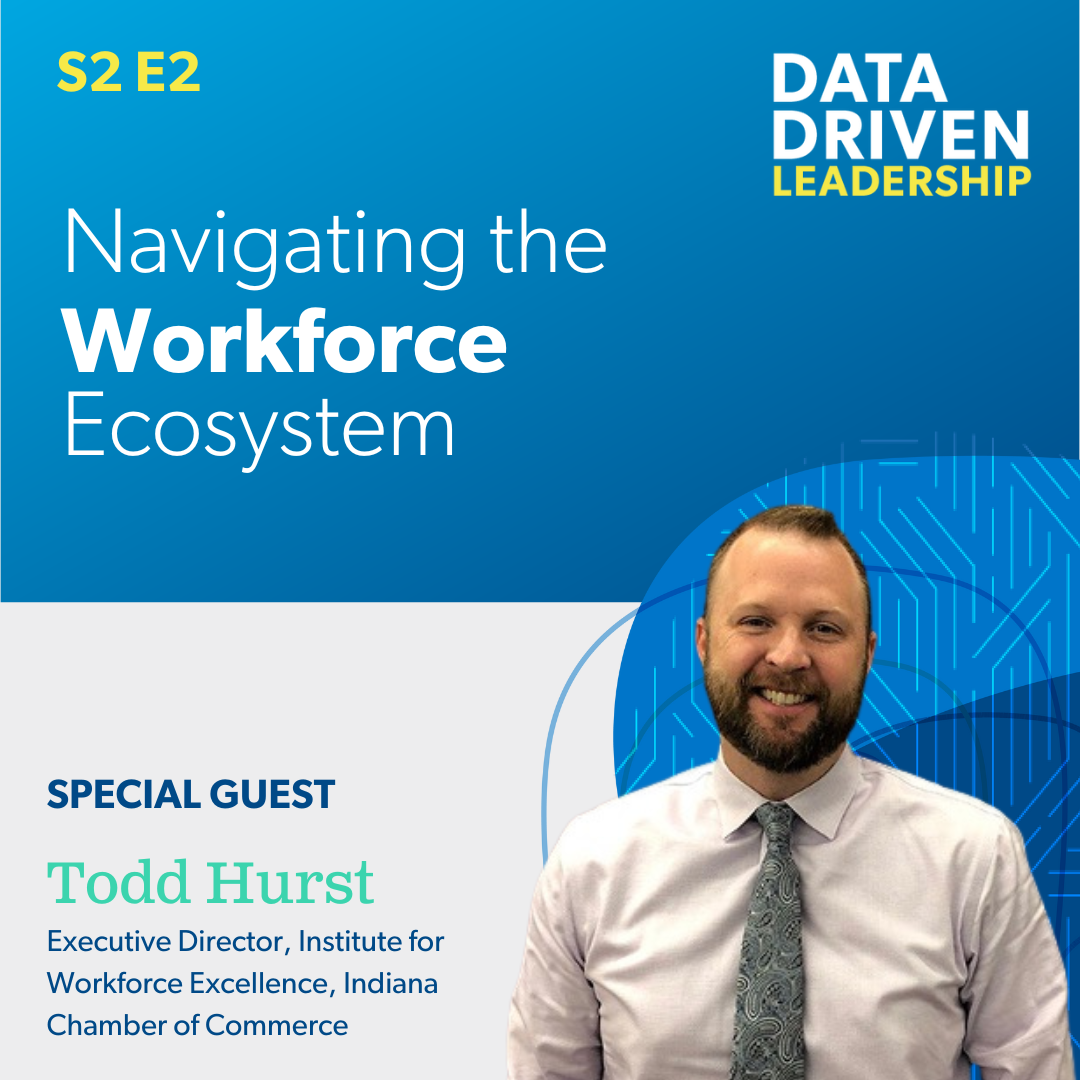
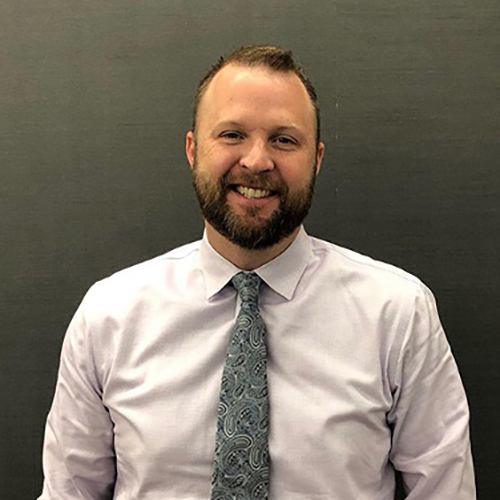
Transcript
Jess Carter: The power of data is undeniable and unharnessed, it's nothing but chaos.
Speaker 2: The amount of data, it was crazy.
Speaker 3: Can I trust it?
Speaker 2: You will waste money.
Speaker 5: Held together with duct tape.
Speaker 6: Doomed to failure.
Jess Carter: This season, we're solving problems in real time to reveal the art of the possible, making data your ally, using it to lead with confidence and clarity, helping communities and people thrive. This is Data Driven Leadership, a show by Resultant.
We're back with Todd Hurst, the Executive Director of the Institute for Workforce Excellence at the Indiana Chamber. In the last episode, we just talked about how he and the organization are leveraging data to drive meaningful insights about where the data's at for education and workforce, and maybe where that conversation needs to go next. Todd, welcome back.
Todd Hurst: Thank you. Thanks for having me back.
Jess Carter: I would love to transition a bit and give you also a chance to talk about the super cool Talent Resource Navigator. Do you want to unpack that for everybody real quick?
Todd Hurst: Absolutely. Yeah. So the Talent Resource Navigator is a project that we've been working on for probably about a year and a half. It launched officially in August, so we've got about six months under the belt of having this out in the world. And really, it emerged in response to something that I think multiple people around Indiana have noticed for a number of years, which is we're incredibly fortunate in Indiana in a lot of ways because we recognize the importance and value of workforce development, and the state has invested heavily in that. And we also have a lot of really fantastic local community philanthropic partners that have invested heavily in that. So across the state, we have a wealth of people working, trying to solve workforce challenges, help companies, help communities, help individuals navigate that system. The challenge with that is that there's a lot of things that exist out there.
And so we've heard over and over again that for employers, sometimes that landscape is so messy, it's difficult to figure out where do you turn, who do you go to, what's a trusted resource or just who can I talk to make sense of all of this because I don't know what I can trust and what I can't. And so the initial concept was we really just need to create a clearinghouse that brings all of that information to a single page and host it so that an employer and individual can quickly go find that information and make sense of it. What we learned in the early phase of building this, what at the time was called a clearinghouse, was that there's actually so much information that it makes no sense. It's too messy if you just put all that stuff in one place. And so we pivoted to what we now call the Talent Resource Navigator, which it is a database, if you want to think about it that way.
But it's a database of resources from across the state of Indiana that we index according to what they do. So is it a resource that helps businesses? Does it serve the construction industry? What are the zip codes within the state that is served? So when you come into the site, you can quickly identify, I'm an individual looking for help, and I want to think about IT. You can take that list of resources that we have within there and quickly narrow that down to the resources that are relevant to you that actually have something meaningful that you could learn from. You can learn information about it, you can connect with them, or you can connect with a member of our team to dive into that further.
So as of today, we have 600 resources within the platform that have all been fully written up, research done on them. We have the tags, the indexing on all of those resources. We know that there are probably twice as many resources that exist out there today as well. So we're doing a lot of work right now going across the state, trying to make sure we're identifying those and figuring out the best method for getting those included while at the same time not overwhelming the system so that it becomes too burdensome. But that's the high level. I can go much more in the weeds too, which is the exciting thing, but yeah.
Jess Carter: Well, it's so important, but I don't know many people understand how big that problem was. So if I, and I really might be wrong here, you are talking about Indiana Career Connect and so there, [inaudible 00:04:19] if you were looking for a job, there were a whole bunch of websites that were appropriate. They weren't fraudulent of any kind, but they were places to land to get support, and they had different strengths and weaknesses and really employer friendly or really certain program friendly. And so if you were under unemployment trying to get re-employed or under TAA or TRA at the unemployment side, there were different programs that were federal programs or state programs that worked with different websites or different skillsets or industries-
Todd Hurst: That's right.
Jess Carter: So am I getting that okay? There's like-
Todd Hurst: Yeah, no, that's absolutely, yes.
Jess Carter: A mess. But it was a well-intended mess.
Todd Hurst: That's exactly right. Yeah.
Jess Carter: Okay. And so it's a microcosm of perhaps what people may have a perception of how things work in the public sector sometimes where it's like it was all really well intended with different funding streams, so it worked, but they all had different silos where they helped people in different ways. So you've now got this database where you're pulling a bunch of those resources together as a one-stop shop.
Todd Hurst: That's right? And I think the important thing of that is, so yeah, we're coalescing it into a single place. I don't think technology solves all of these problems though. We can put it all in a single place. The really unique thing about this is though that if you're an individual across the state and you have a question, you can read about it, you can go to the website, you can apply for stuff, but maybe you just want to talk to somebody and really understand what are the range of options that are available or can you provide a warm introduction? That's where our team can come in. So we have a on-demand element to the platform as well, where once you create an account, you can immediately email a member of our team or connect to our team's calendar through Calendly and set up a conversation through Zoom so that you can have a one-on-one conversation.
We can do an inventory and figure out what are your real challenges, what are you looking for, what's worked before, what hasn't worked before? And then I think probably what we have found is the most meaningful impact of this is yeah, you want to talk about... I'll give an example from recently. You want to talk about how your company can potentially hire individuals who are involved in the justice system or recently released individuals. You know what? I know somebody over at Department of Correction. I can make a warm introduction, set up a conversation that I can follow up on and make sure that you get what you need. And furthermore, I'm probably going to follow back up in a week to make sure that that conversation happened. And do you have any additional questions as well? So it's that level of customer support that I think is unique that we're trying to bring to the talent development space.
Jess Carter: That is incredible because even when I've worked on a few of these things before, some of my challenges, I was right out of college, but I remember thinking most of the people I knew got jobs because of their network, not because of a application process. And so as we were providing all these services to individuals or citizens, I had that question of what if you just need the right connections and can we find a way to help people with those? So it sounds like you guys, you're using technology and people to help solve this problem in a unique way.
Todd Hurst: That's absolutely right. I think the other thing that, well, there are a couple of things here that I could also go into, but one other element that we built in was some work that we had done with really was a grant from Lumina Foundation and from Chase Foundation a few years ago that we brought together employers across the state of Indiana and had them build what we call the self-assessment that an employer could sit down, work through three various assessment modules and the results would say with regard to HR practices, "Here are some things that maybe you just score so well on that you could think about or your engagement with community partners."
So we have this built within the platform now that one will begin to direct people based upon your responses. Maybe these are some resources locally that could help you, but I think probably the more powerful thing is we're actually in the process right now of building out the next release, say a feature where we can add new modules to that so we can sit down and say, back to the conversation around work-based learning, let's have a module around work-based learning.
What is your company doing in that right now? Where are there gaps in that system that you need help with? We can capture that information and we can make the connections to whether it's Ivy Tech, DWD, I mean, whoever those partners are that can help address some of those challenges that you're currently seeing or facing.
Jess Carter: Wow. So then to be clear, would you say Talent Resource Navigator is both for an individual looking to make a change and for an employer looking to find individuals?
Todd Hurst: That's right. No, it is absolutely for both. I will say we are not a direct service provider ourselves. So if an individual comes to us through the navigator and finds information, we're probably going to connect them to a local resource provider. And we've talked a lot actually with the workforce boards across the state of how do we coordinate that effort as well, especially for someone who, let's say they come to the system with less than a high school diploma, we can field that and then make the right connection and ensure that they get the information that they need at a local level to be able to connect them into the local support systems.
Jess Carter: I am going to resist the urge to have you explain what a web is on this call-
Todd Hurst: Thank you.
Jess Carter: But people can Google Workforce Investment Board because your state has them and, you're welcome. But your point is like you guys are operators. You understand the right information to help piece the information together and help somebody find somebody else and make some connections.
Todd Hurst: That's exactly right. I mean, we operate at this systems level across the state because we're thinking about it from a systems' problem, and so we're able to see all of the interconnected pieces, and frankly, what we're trying to do is make sense of it. Everything that we're doing at the institute in general is trying to help break down some of the barriers, the existing silos and say, "How do you navigate the system to get to the type of outcomes that you need?" Because it is incredibly complex, but it doesn't necessarily need to be. I've been working in workforce development in Indiana for almost 20 years now, and I know the ins and outs, someone whose brand new to it doesn't. Let me help share what I know to get you to the right place to be successful.
Jess Carter: Okay, so I have to ask this because you are certainly a data driven leader. Something that I want to ask is you are somebody who can move really fast. You are fully capable. You also have a ton of information in your head about some of this. You do a remarkable job moving at the pace that the needs demand, not just moving at a pace Todd can move at. And I think that's really data driven. You don't shove things at people, you don't create something that no one's ready for. You are really good at collaborating across organizations and entities or regions and states. Do you have any insights on here's one to three thoughts I have about if somebody struggles with their pace compared to the pace that they need to move at?
Todd Hurst: Yeah, I don't know that I have any... I maybe have maybe an explanation of why I think I do that.
Jess Carter: I'll take that.
Todd Hurst: Not advice, but here's wrong with me.
Jess Carter: Welcome to my office.
Todd Hurst: I think in general, and this about me, Jess, that I have a background in design thinking too. And one of the reasons that I was drawn towards design thinking was the extreme human natured element of this. And throughout my life, I've always described myself as an empathetic person. I very much think about things from others' perspectives and try to put myself in other shoes as I am doing my work or even in my personal life as well. And so I think that factors into this. When I'm thinking about how do we solve a problem, and data may be a real frustration to me with regard to what data we're collecting with work-based learning, but when I really start to dig in and understand it's not because people don't want to give you the data, it's because our systems and architecture is really outdated or the funding mechanisms don't incentivize us to think about it in different ways.
It's not a people problem, it's a strategy problem. And so there's no sense in getting frustrated with people. It's how do we solve it and recognizing it may take a little bit of time, but being able to do that in a way that you're trying to do it together is really the only way that we're going to be successful in my mind.
Jess Carter: Well, and I'm going to make you dig on one more thing about you that I think makes you such a good leader. It would make sense with 20 years of content in your head, at some point it would make sense for people in that scenario to almost become paralyzed by how much they know, what do I do and how do I leverage it the right way. How do you avoid that paralysis?
Todd Hurst: That's a good question. I think probably because I don't have a great memory and have just forgotten most of it.
Jess Carter: Not true.
Todd Hurst: No, I think because you see continual progress being made. I had a really good conversation recently where I was being grumpy and was complaining frustratingly to a mutual colleague of ours, and she reminded me that, "Yeah, you say that, but over the last 10 years, look at all that has been accomplished", and occasionally you have to step back and say that because really, yeah, I mean over the last 10, 15 years, the state of Indiana has come a really long way in workforce development, and it's through a lot of really great leaders who have driven towards outcomes for individuals and trying to create environments that lead to well-paying jobs and economic progress. And we might be able to get caught up in the minutiae of today and the frustrations of our problem that's right in front of us. But when you actually step back, in the grand scheme of things, we're heading in the right direction in a lot of ways, and it's an exciting time.
Jess Carter: I think that one of the elements of your success that you've demonstrated here, but you haven't called out, is your ability to stop and reflect. You do stop, and you have the friends and support to say, "Hey, I need to vent for a minute. Help me out when I can't see the bigger picture." I think that those skills make for leaders that can sustain themselves in leadership for decades, and I think that that is just a testament that you share with your time and energy.
Todd Hurst: Well, I appreciate that. I think the deeper people get to know me, the more they get my frustrations though, so.
Jess Carter: Sure.
Todd Hurst: So I don't know that for instance, Jason, who is my direct supervisor here, he is like, "Man, you've become grumpier." I'm like, "You got to know me better. This happens over time."
Jess Carter: You're just a safe place for me.
Todd Hurst: Exactly. We all see the calm face, right? But yeah.
Jess Carter: Yes. Well, yeah, we all need those safe places, but I think that that is also a testament of your passion. So I see somebody who has demonstrated a commitment to their industry and making a difference and has chased all the right opportunities to continue to make a difference and stay passionate, which means sometimes we grumble. That's okay. That's okay.
Todd Hurst: No, absolutely.
Jess Carter: It means you care. Well, is there anything I missed about the Talent Resource Navigator that we should have talked about that's any shiny favorite feature you have?
Todd Hurst: Yeah, so we talked about the assessment feature, which I am really excited about, and we're actually developing that out. The other thing that we're in the process of trying to figure out exactly how to build it out within the navigator right now is you have talent development programs, but back to this idea that workforce development's not a singular thing, it's an ecosystem. And so for employers, they need people to be trained, but they also need people that can show up to work, that have transportation, that have childcare options, that may need help thinking about substance use disorder. So we're tying in a couple of things that I think will be really meaningful to that. One is we're thinking about those resources that maybe aren't talent resources, but they're direct service resources. They're helping in those wraparound services and being able to provide a map of that across the state of where all of those are, who defined. One, it's beneficial to the on the ground communities.
So we've talked to some of the local nonprofits to say this will help us to be able to map this out and quickly tell that story. It also can be really useful from an economic development perspective too, to say to an employer, "As you're thinking about this community, here's the ecosystem that's locally. Here's what resources are available, who does what. We can connect you to these folks." So that's really exciting. The other thing that will be coming down the pipe, which will be a part of a bigger campaign I would say for us is we know across the state of Indiana that there are employers coming together with community partners, with nonprofits, with educational and training institutions that are just doing amazing work to help individuals find meaningful career options with career advancement, while at the same time helping the employer address some of their talent shortages.
And so we've identified a few of these and we're returning these promising practices for the time being, just for lack of a better name, but I oftentimes describe it as it's kind of a recipe. You have your local partners, you have your training programs, you have your transportation, you have all these things that come together that when combined make this really amazing program that an employer can launch at. One of the first ones we're going to highlight is My Cook Pathway and what Cook Medical is doing with individuals with less than a high school diploma, getting them a degree, getting them a job, getting them a pathway towards further degree credentials and increased opportunity within their employment. That's a model that, with the right components, and those components exist otherwhere, that can be replicated.
It doesn't have to be you pick up that exact same thing, but it may be a different nonprofit. You may be using a different state program to make it happen, but we don't always have to go back to the wheel and recreate everything from scratch, which I think is one of the challenges we have in Indiana is that every time there's funding on the table, we have to make something brand new and shiny when we have some of these existing. So let's go out, let's document those, tell those stories, and then also as part of that, we can help others figure out how to do that, but we can also hold up these promising practices and say these are employers who are coming to the table and really serving as co-creators of talent. They're not sitting back waiting for the talent to show up to them.
And that is, I think, truly how we begin to solve some of our talent attainment gap in Indiana is recognizing that we need to attack it from all fronts. We need to have employers at the table, upskilling individuals. We need to be working at the K-12 level. We need to be bringing people who are on the sidelines right now and out of the workforce back into the system, and it's going to take all of us working collaboratively, and I think employers play a really significant role there.
Jess Carter: Yeah, I agree. I think as you've talked about work-based learning or we talked about internships or early career, some of the things that you're also so talented at is helping understand how we call it this, sometimes in this workforce world, the supply and demand meet, and the supply sometimes is our K-12. How are we generating employable people? And I look at my four-year-old and my almost two-year-old multiple times and think like, "God help us." And so mostly because my four-year-old is bossing me around, and so I'm like, "Okay, well, let's just see what happens here." But it is true that it's like that is our next generation of workforce, and so how do we understand where the economy is headed and where the jobs will be and where we want them to be in 20 years in Indiana, and how do we make sure that we're preparing and retaining talent for those jobs, right? It's crystal abolish, but super fun.
Todd Hurst: Yeah, no, absolutely.
Jess Carter: Todd just helped us learn a little bit about the Talent Resource Navigator tool that he's been building with his team. I think that something that's helpful for me to think about is its kind of fun, but in Todd's line of business, if I asked him who's a competitor, it's like another state. We're trying to retain and build up excellent talent in Indiana for the business needs that we have in the future and today. And so as he's trying to come up with creative, insightful ways to make Indiana even better, this talent Resource Navigator pulls together all of the resources available, and that really does mean websites and programs and local programs that are specific to your community in Indiana as a one-stop chop to say, "Are you an employee looking for a change or you want to know about whether you should go back to school or what it would look like if you wanted to look for a job in a different city in Indiana?"
Or employer, "Are you about to go through severe growth and you need to know if the talent exists here in order to handle your growth?" There's all of these needs that employees and employers have, and the Talent Resource Navigator is going to be this incredible tool Indiana has to pull all of these entities, nonprofits, and for-profits and the government together to say, "Hey, we can provide one single place you can come to look for new work or to look for new talent and to get resources on the phone to help put you together and connect you with someone else." It helps me to think of it as an operator that's just understanding a need and plugging in a solution.
So I am super excited about Talent Resource Navigator and really appreciate the way that I think it's going to help Todd and help Indiana set itself apart. If you have specific topics that you want to hear about more, please rate and review the podcast and let us know how we can work to incorporate those into future episodes.
Thank you for listening. I'm your host Jess Carter, and don't forget to follow the Data Driven Leadership wherever you get your podcasts and rate and review, letting us know how these data topics are transforming your business. We can't wait for you to join us on our next episode.
Insights delivered to your inbox




